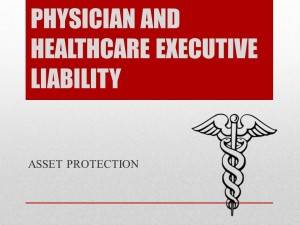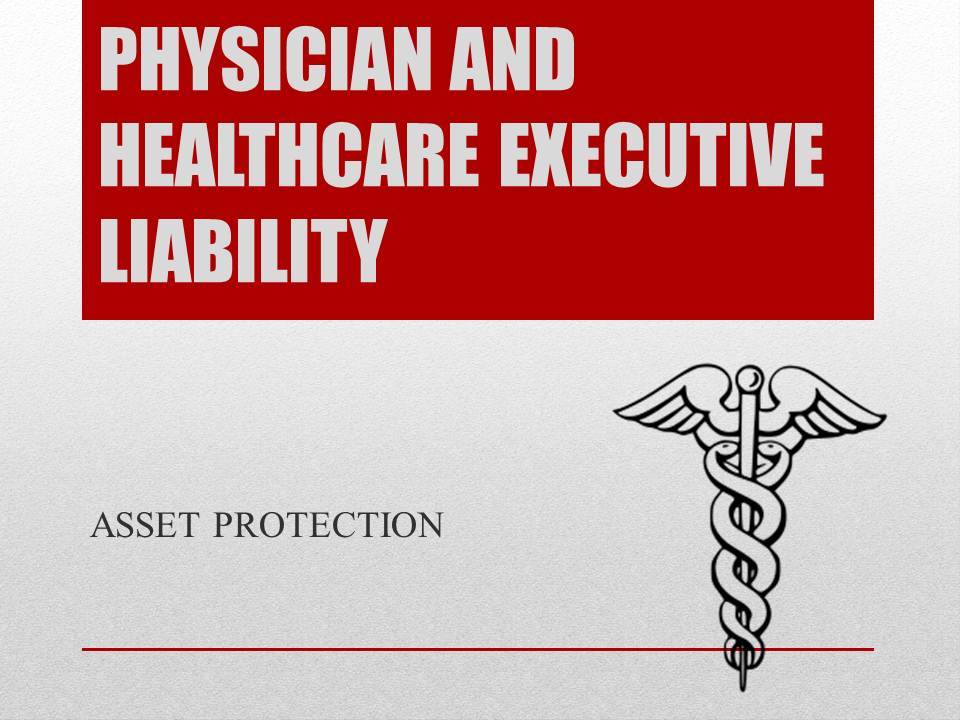 Asset protection for doctors is the main focus of this column (note: this article originally appeared at www.PhysiciansPractice .com, The Nation’s Leading Practice Mgmt. Resource) and we’ve examined it from many angles over the last 100+ articles I’ve shared here. Today, we examine the issue of defensive medicine, much decried by politicians and insurance companies and the role a thorough diagnosis, free of fear of such claims by a third-party payer, plays in good medicine and your own risk management plan.
Asset protection for doctors is the main focus of this column (note: this article originally appeared at www.PhysiciansPractice .com, The Nation’s Leading Practice Mgmt. Resource) and we’ve examined it from many angles over the last 100+ articles I’ve shared here. Today, we examine the issue of defensive medicine, much decried by politicians and insurance companies and the role a thorough diagnosis, free of fear of such claims by a third-party payer, plays in good medicine and your own risk management plan.
The inappropriately deemed “common wisdom” regarding medical malpractice lawsuits and the overuse of diagnostics due to so-called defensive medicine is something like this:
1. There is a national medical malpractice lawsuit crisis;
2. Doctors run too many unnecessary tests to avoid being sued;
3. These tests have little medical value and are not necessary or reasonable to providing good care; and
4. It is because of this so-called abuse that healthcare and insurance costs are high, fewer medical procedures including testing can be covered, and your compensation must continually be reduced.
This is an admitted oversimplification of the arguments from both sides, but it seems to me that the loudest opponents of this standard of care regularly fall into two primary categories: marginally informed politicians looking for a hot button issue to trumpet and insurance companies and their lobbyists and publicists. It’s my opinion that neither of these groups have effective diagnosis, treatment. or doctors at heart.
I have worked with a national client base of several thousand doctors for 11 years and have seen every imaginable form of liability you can imagine. If you’re a regular reader of this column you know I take the threat to your wealth posed by litigation very seriously and have repeatedly addressed the threat of medical malpractice lawsuits in particular, so let’s assume that I agree you are at risk; in fact most of you will statistically face such a claim twice in your career.
Now, let’s look at the fact pattern behind a vast number of medical malpractice claims, a majority of which (some 35%) center on either “failure to diagnose” or “misdiagnosis” claims by plaintiff patients or worse, their surviving family members. We don’t need to look far for examples. I get news updates on medical malpractice claims, settlements, and lawsuits several times a week and cases like the recent failure to diagnose a bone infection in Texas that lead to a suit against an orthopedic surgeon, the death of a six-year-old child in Dallas after his internal injuries were misdiagnosed as constipation and treated with enemas, and the misdiagnosis of lymphoma in Louisiana as an infection that was treated with antibiotics and which led to the patient later needing surgery and radiation are common. In the latter case, the lawsuit included claims for damages including, “medical expense, physical pain and suffering, mental anguish, economic loss, diminution of earning capacity, disability, fear of death, scarring, disfigurement and loss of enjoyment of life”. What else do these three cases have in common? They are all from the headlines of the last one week.
I’m not a doctor and my knowledge of the cases is limited to the reports I’ve shared, so humor me and assume that the facts in these are accurate as reported. I am, however, an attorney and I know many other excellent attorneys, including the ones that sue doctors (and everyone else) for a living, here’s a little of what they’ve shared with me:
• Yes, is there is a pool of crooked attorneys out there churning frivolous cases and looking to scare and extort settlements out of any poor doctor they can get their sights on;
• This group is relatively small and spends most of their time on lower level cases that are typically settled or relatively easier to win, like conventional personal injury, dog bites, car accidents, slip and falls, etc;
• The best (meaning most successful and highest recovering) medical malpractice attorneys play to win and hedge their bets by carefully screening cases. They invest significant amounts of time and actual dollars in fronting costs for many claims and don’t usually take cases they don’t think they can win or which are at least strongly arguable as to causation in their client’s favor; and
• A key element of their claims is often related to the testing that could or should have been done to prevent further distress, or worse, to the patient. This standard of care is easily arguable both ways and poses a significant risk to your career and solvency.
My advice to doctors given these fact patterns is simple: Practice “defensive medicine” that puts the full range of modern diagnostics at your patient’s disposal. Its good medicine, good risk management, and the life you save may also be your own.



1 thought on ““Defensive Medicine” is often Good Medicine and “Best Practice” for Doctors”
Pingback: Lawsuits Against Doctors Are For More Than Just Medical Care Delivered | Pro Asset Protection
Comments are closed.